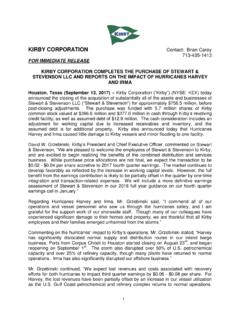Transcription of The Stevenson / Farmer review of mental health …
1 Thriving at workThe Stevenson / Farmer review of mental health and employersOctober 2017 Dear Prime Minister,On January 9th you asked us to undertake an independent review into how employers can better support the mental health of all people currently in employment including those with mental health problems or poor well-being to remain in and thrive through work. This has turned out to be a very timely brief. Our work has revealed that the UK is facing a mental health challenge at work that is much larger than we had thought. Not only is there a big human cost of poor mental health at work, there are also knock on impacts for society, the economy and Government.
2 Employers are losing billions of pounds because employers are less productive, less effective, or off sick. Happily our research has found green shoots of good practice. Using good practice and evidence where it exists, this review sets out a number of mental health core standards that can be adopted across all workplaces at little or no cost. We strongly recommend that change be encouraged by increasing employer transparency not only internally to their employees, but also across industries and through the public domain. You will see in the report that we very much hope you will lead the way in committing the public sector to implement these measures, and use Government policy to encourage and support employers more effectively.
3 Our vision which is in our view wholly realistic is that in ten years time the following changes will have happened: Employees in all types of employment will have good work , which contributes positively to their mental health , our society and our economy. Every one of us will have the knowledge, tools and confidence, to understand and look after our own mental health and the mental health of those around us; All organisations, whatever their size, will be: equipped with the awareness and tools to not only address but prevent mental ill- health caused or worsened by work; equipped to support individuals with a mental health condition to thrive, from recruitment and throughout the organisation; aware of how to get access to timely help to reduce sickness absence caused by mental ill health .
4 We dramatically reduce the proportion of people with a long term mental health condition who leave employment each year and ensure that all, who can, benefit from the positive impacts of good work. The UK could and should be one of the leading nations in relation to mental health . If the UK prioritises mental health at work, we can become global leaders in reducing stigma, improving the mental health of the population and support for those who need it, and in the process improve the UK s productivity. We very much hope that Government is able to implement our recommendations, measure the results and make a long-term commitment to improving mental health at work.
5 Yours sincerelyThriving at Work: The Independent review of mental health and Employers4 Executive summaryThe Prime Minister announced on 9 January 2017 that she was asking us to carry out an independent review into how employers can better support all individuals currently in employment including those with mental ill health or poor well-being to remain in and thrive through work. Many employers are already creating healthy, inclusive workplaces, but more needs to be done so that employers provide the support needed for employees with mental health conditions. Prime Minister Theresa May, January 20175 Executive summaryThis study has led us to conclude that underneath the stigma that surrounds mental health and prevents open discussion on the subject, the UK faces a significant mental health challenge at work.
6 While there are more people at work with mental health conditions than ever before, 300,000 people with a long term mental health problem lose their jobs each year1, and at a much higher rate than those with physical health conditions. Behind this, our analysis shows that around 15% of people at work2 have symptoms of an existing mental health condition. The human cost is huge, with poor mental health having an impact on the lives of many individuals and those around them. This manifests itself in a variety of ways both at work and at home, and impacts a person s ability to manage other elements of their personal life.
7 Then there is the ultimate human cost of loss of life through suicide. We know that rates of poor mental health and suicide are higher for employees in certain the help of an independent study on the cost to employers commissioned from Deloitte, we have also found: There is a large annual cost to employers of between 33 billion and 42 billion3 (with over half of the cost coming from presenteeism when individuals are less productive due to poor mental health in work) with additional costs from sickness absence and staff turnover. The cost of poor mental health to Government is between 24 billion and 27 billion4.
8 This includes costs in providing benefits, falls in tax revenue and costs to the NHS. The cost of poor mental health to the economy as a whole is more than both of those together from lost output, at between 74 billion and 99 billion per a time when there is a national focus on productivity the inescapable conclusion is that it is massively in the interest of both employers and Government to prioritise and invest far more in improving mental health . The UK can ill-afford the productivity cost of this poor mental could be argued that these costs are the normal cost of being alive and doing business.
9 Our work suggests strongly that this is not the case. Deloitte s analysis of the case studies where investments have been made in improving mental health show a consistently positive return on a finding which is bolstered by a number of academic meta-studies which demonstrate the benefits of good work for mental health6 and key workplace enablers. As this review is going to press, the Lancet has also published findings from a study in the Australian Fire Service which found that a manager mental health training programme could lead to a significant reduction in work-related sickness absence, with an associated return on investment of for each pound spent on such training.
10 This is borne out by our own conversations with over 200 organisations which have uncovered a number of successful investments, activities and approaches in improving the mental health of approach and visionWe start from the position that the correct way to view mental health is that we all have it and we fluctuate between thriving, struggling and being ill and possibly off work. People with poor mental health including common mental health problems and severe mental illness can be in any of these groups. An individual can have a serious mental health problem but with the right support can still be thriving at at Work: The Independent review of mental health and Employers6We need to move to a society where all of us become more aware of our own mental health , other people s mental health and how to cope with our own and other people s mental health when it is all our responsibilities to make this change.















